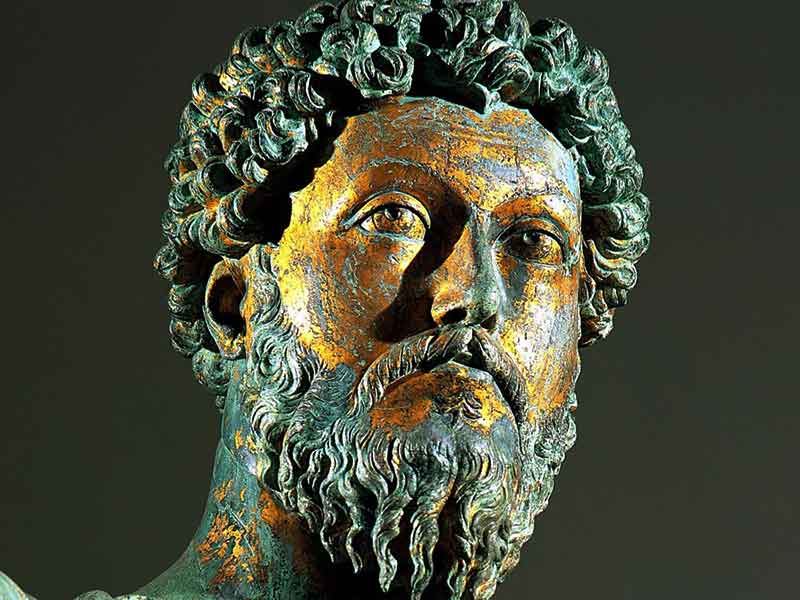Proud to introduce to you Emperor Marcus Aurelius
Emperor Marcus Aurelius
Marcus Aurelius (born April 26, 121, Rome; died March 17, 180, likely at Vindobona, modern-day Vienna) was a Roman Emperor from the Antonine Dynasty who reigned from 161 to 180 AD and is renowned as a Stoic philosopher.
Originally named Marcus Annius Verus or Marcus Catilius Severus, he was later adopted by Emperor Antoninus Pius and took the name Marcus Aelius Aurelius Verus. Upon becoming emperor, he was known officially as Marcus Aurelius Antoninus Augustus.
Birth
26 April 121 AD, Rome, Italy
Death
17 March 180 AD, Sirmium
Known for
His book "Meditations"
Successful Defensive Wars
Marcus Aurelius skillfully led a series of defensive military campaigns that preserved the stability of the vast Roman Empire. Notably, he confronted and defeated several Germanic tribes including the Marcomanni, Quadi, and Sarmatians. These wars, fought primarily along the empire’s northern frontiers, were critical in maintaining Roman territorial integrity and preventing invasions during a period of significant geopolitical pressure. His military leadership demonstrated resilience, strategic acumen, and commitment to securing the empire’s borders despite ongoing external threats.
Imperial Administration
Beyond the battlefield, Marcus Aurelius was deeply involved in the governance and administration of the empire. He focused on enhancing the efficiency of the imperial bureaucracy and instituted important legal reforms aimed at promoting justice and fairness. His policies sought to reduce corruption among officials and improve the welfare of Roman citizens, reflecting his Stoic ideals of duty and virtue. Marcus emphasized accessibility in the legal system, ensuring that even the lower classes could seek redress, which helped to stabilize Roman society during his reign.
Philosophical Legacy
From a young age, Marcus Aurelius received rigorous training in Greek and Latin rhetoric from prominent tutors like Herodes Atticus and Marcus Cornelius Fronto, with whom he maintained a rich correspondence, parts of which survive.
His philosophical outlook was deeply influenced by Stoicism, particularly through figures such as Epictetus, Apollonius of Chalcedon, and Sextus of Chaeronea.
His principal work, originally written in Greek, is titled Ta eis heauton ("To Myself"), later translated into Latin as Meditationes. Composed in twelve books, it presents a practical moral philosophy aimed at everyday living.
His writings emphasize that a virtuous life, in accordance with nature’s laws, leads to inner peace, greatness, and perfection. Marcus believed one should focus on what benefits both oneself and the community, valuing the present moment over attachment to future or past events.
He saw death as a natural and inevitable transformation, part of the eternal cycle of creation and decay that governs the universe.
Leadership during Challenging Times
Marcus Aurelius’ reign was marked by significant crises, including the devastating Antonine Plague, which severely impacted the population and economy of the empire. Despite these hardships, he displayed remarkable leadership by prioritizing public health measures and providing aid to suffering communities. His ability to maintain relative stability, both politically and socially, during such tumultuous times highlights his compassionate and stoic approach to governance.
Legacy of Wisdom
The timeless wisdom contained in Marcus Aurelius’ Meditations has made him a symbol of resilience, inner peace, and practical philosophy. His reflections on confronting adversity and maintaining moral integrity continue to influence leaders, philosophers, and scholars worldwide. His legacy embodies the ideal of ruling with wisdom and humanity, qualities that define his reputation as the philosopher-king.
Role in the Spread of Christianity
The role of Marcus Aurelius in the spread and treatment of Christianity during his reign remains a subject of historical debate. While persecution of Christians did increase during this time, there is no clear evidence that Marcus Aurelius personally initiated or directed these actions. The heightened repression was often enforced by local officials rather than by explicit imperial decree.
His Stoic philosophy emphasized virtue, duty, and respect for traditional Roman religious practices, which he regarded as essential for social order and stability. This emphasis may have indirectly influenced a less tolerant stance towards emerging religions like Christianity that challenged established traditions. Nonetheless, Marcus Aurelius’ approach seems to have been more about maintaining civic unity than targeting any faith specifically.
Emperor Marcus Aurelius Summary
Marcus Aurelius Antoninus, Roman emperor from 161 to 180 AD, was not only a skilled and diligent ruler during times of crisis but also one of the most important Stoic philosophers in history. His life combined military leadership, administrative reforms, and philosophical contemplation, firmly establishing his legacy in both Roman history and Western philosophy.

Content created by:
Alex Costin
Results driven services:
Digital Marketing
Need my expertise?
Contact me
No tracking cookies!
General information purposes only!
Business partners offers (backlinks):
Search Engine Optimisation agency:
SEO
Explore this city secret guide:
Barcelona
Outdoor recreational activity:
Canyoning
Wide range of financial services:
Chartered Accountant
Copyright © 2023-2025 Alex Costin